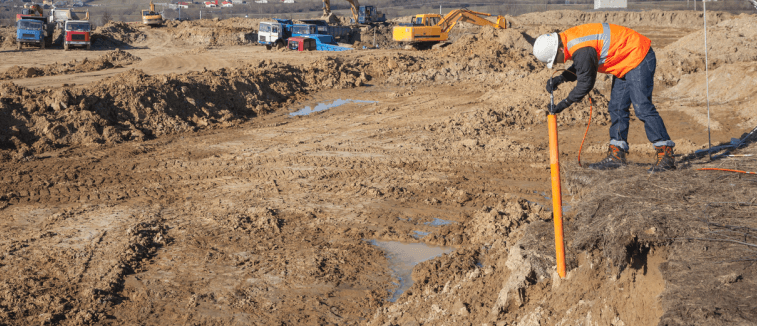Not known Incorrect Statements About Geotheta
Geotheta for Dummies
Table of ContentsNot known Details About Geotheta 6 Easy Facts About Geotheta DescribedSome Known Details About Geotheta 4 Simple Techniques For GeothetaNot known Factual Statements About Geotheta

They carry out website investigations, accumulate samples, execute laboratory tests, and analyze information to review the viability of the ground for construction jobs - Consulting Engineers. Based upon their searchings for, geotechnical engineers offer suggestions for structure style, incline security, retaining structures, and mitigation of geotechnical hazards. They work together with various other professionals, such as architects, architectural designers, and building and construction groups, to make certain that geotechnical considerations are incorporated right into the total project layout and implementation
By analyzing the actions and properties of dirt and rock, they can recognize potential geotechnical dangers such as landslides, dirt negotiation, or incline instability. Their knowledge assists avoid failures or accidents that could endanger lives and residential property. Below are some thorough duties and responsibilities of a geotechnical designer: Website Investigation: Geotechnical engineers conduct website examinations to gather information on subsurface problems.
They analyze the data to comprehend the properties and habits of the soil and rock, including their stamina, leaks in the structure, compaction attributes, and groundwater problems. Geotechnical Analysis and Style: Geotechnical designers analyze the data accumulated during site investigations to evaluate the security and viability of the website for construction projects. They carry out geotechnical computations and modeling to assess aspects such as bearing capacity, settlement, incline security, lateral planet stress, and groundwater flow.
The Best Strategy To Use For Geotheta
Foundation Style: Geotechnical designers play an important role in developing structures that can securely sustain the desired framework. They evaluate the dirt conditions and tons demands to establish the suitable structure type, such as superficial structures (e.g., footings), deep foundations (e.g (https://geotheta.godaddysites.com/f/why-geotechnical-engineers-are-your-projects-best-friends)., piles), or specialized techniques like dirt enhancement. They consider variables such as negotiation limitations, birthing capability, and soil-structure communication to create ideal structure layouts
They review building strategies, display site activities, and perform field inspections to validate that the design recommendations are followed. If unforeseen geotechnical concerns develop, they evaluate the circumstance and supply suggestions for removal or changes to the layout. Risk Evaluation and Reduction: Geotechnical designers analyze geotechnical dangers and dangers associated with the project website, such as landslides, liquefaction, or dirt disintegration.

Partnership and Interaction: Geotechnical engineers work very closely with various other specialists associated with a task, such as engineers, structural engineers, and building and construction teams. Effective communication and cooperation are vital to integrate geotechnical considerations right into the overall task style and construction procedure. Geotechnical engineers offer technical competence, response questions, and make sure that geotechnical requirements are fulfilled.
How Geotheta can Save You Time, Stress, and Money.
Right here are some sorts of geotechnical designers: Structure Engineer: Structure designers focus on creating and examining structures for structures. They examine the dirt problems, lots requirements, and site qualities to figure out the most proper foundation type and design, such as shallow structures, deep foundations, or specialized techniques like heap foundations.
They review the factors influencing incline security, such as dirt residential or commercial properties, groundwater conditions, and incline geometry, and develop techniques to avoid slope failings and mitigate risks. Earthquake Designer: Quake engineers focus on evaluating and making structures to withstand seismic forces. They evaluate the seismic risk of a website, review soil liquefaction potential, and create seismic layout criteria to make certain the safety and durability of frameworks throughout quakes.
They execute area testing, collect samples, and evaluate the collected information to characterize the dirt properties, geologic developments, and groundwater problems at a site. Geotechnical Instrumentation Designer: Geotechnical instrumentation designers concentrate on monitoring and gauging the behavior of soil, rock, and structures. They set internet up and maintain instrumentation systems that monitor variables such as soil negotiation, groundwater levels, incline motions, and structural variations to evaluate performance and supply early warnings of prospective issues.
The Ultimate Guide To Geotheta
They perform tests such as triaxial examinations, debt consolidation examinations, straight shear tests, and permeability examinations to gather data for geotechnical analysis and layout. Geosynthetics Designer: Geosynthetics engineers focus on the design and application of geosynthetic materials, such as geotextiles, geogrids, and geomembranes. They utilize these materials to boost soil stability, reinforce slopes, offer drainage options, and control disintegration.
They have a tendency to be investigatory people, which indicates they're intellectual, introspective, and inquisitive. They are interested, methodical, reasonable, analytical, and logical. A few of them are likewise social, meaning they're kind, charitable, participating, individual, caring, helpful, empathetic, sensible, and friendly. Does this seem like you? Take our free job test to learn if geotechnical engineer is one of your leading profession suits.
In the office environment, geotechnical designers utilize specialized software devices to perform computations, develop layouts, and examine data. They prepare reports, evaluation project requirements, connect with customers and staff member, and coordinate project activities. The office setup supplies a favorable atmosphere for study, evaluation, and cooperation with other specialists associated with the project.
Geotheta Fundamentals Explained
They frequently check out task websites to conduct site investigations, examine geotechnical conditions, and collect data for evaluation. These brows through involve traveling to different areas, in some cases in remote or tough terrains. Geotechnical engineers may carry out dirt tasting, conduct tests, and monitor building activities to make sure that the geotechnical aspects of the task are being executed appropriately.
Geotechnical engineers likewise function in specialized geotechnical laboratories. Geotechnical research laboratory designers function extensively in these atmospheres, taking care of testing tools, running instruments, and taping data.